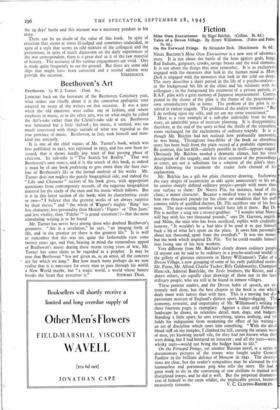Beethoven's Art
Beethoven. By W. J. Turner. (Dent. 6s.) LOOKING back on the literature of the Beethoven Centenary year, what strikes one chiefly about it is the somewhat apologetic tone adopted by many of the writers on that occasion. It was a time when the old emotions were rathet out of fashion, and where emphasis in music, as in the other arts, was on what might be called the Art's-sake rather than the Christ's-sake side of art. Beethoven was honoured but a little shelved ; his music, it seemed, was too much concerned with things outside of what was regarded as the true province of music. Beethoven, in fact, took himself and man- kind too seriously. It is one of the chief virtues of Mr. Turner's book, which was first published in 1927, was reprinted in 5933, and has now been re- issued, that it shows hardly any trace of that passing phase of criticism. Its sub-title is "The Search for Reality." That was Beethoven's own search, and it is the search of this book, as indeed it must be of any book professing to give more than the bare out- line of Beethoven's life or the formal analysis of his works. Mr. Turner does not neglect the purely biographical side, and indeed the " Life and Character " section of his book gives, with appropriate quotations from contemporary records, all the requisite biographical material for the study of the man and his music which follows. But it is in this latter section of the book, with its characteristic credo or two—" I believe that the greatest works of art always surprise by their excess " and " the whole of Wagner's mighty ' Ring' has less character, less personality than Mozart's Figaro ' or Don Juan,' and less vitality, than Fidelio ' (a grand statement ! )—that the most stimulating writing is to be found
Mr. Turner has never been among those who doubted Beethoven's greatness. " Art is a revelation," he says, " an imaging forth of life, and in the greatest art there is the greatest life." It is well to remember that this was no quite the fashionable view some twenty years ago, and that, bearing in mind the tremendous appeal of Beethoven's music during these recent trying years of war, Mr. Turner has some claim to be regarded as a prophet. It may be true that Beethoven " has not given us, as an artist, all the concrete joy for which we long." But how much more perhaps do we now realise that it is necessary for every man to pass through his world, a New World maybe, but " a tragic world, a world whose beauty


























 Previous page
Previous page